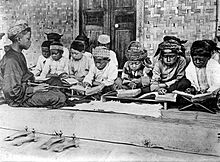
Back Dayah ACE بيسنترين Arabic Pesantren German Pesantren ID プサントレン Japanese Pesantrèn JV Ponḍhuk pasantrèn MAD Sekolah pondok Malay Pesantren Somali Pasantrén Sundanese

Pesantren is a traditional Islamic boarding school in Indonesia. It is taught either in private houses, a pondok or a mosque, the teaching includes classical Islamic texts and santri thought, taught by kyais.[1] According to one popular tradition, the pesantren education system originated from traditional Javanese pondokan, dormitories, ashrams for Hindus or viharas for Buddhists to learn religious philosophies, martial arts, and meditation. Institutions much like them are found across the Islamic world and are called pondok in Malaysia, Southern Thailand and madrasas in India and Pakistan and much of the Arabic-speaking world. The pesantren aims to deepen knowledge of the Quran, particularly through the study of Arabic, traditions of exegesis, the Sayings of the Prophet, law and logic. The term pesantren derives from the root word santri or student -- pe-santri-an or the place of the santri.[2]
As social institutions, pesantren have played a major role over the centuries. They emphasise core values of sincerity, simplicity, individual autonomy, solidarity and self-control. Young men and women are separated from their families, which contributes to a sense of individual commitment to the faith and close bonding to a teacher.[3][1]
- ^ a b Dhofier, Zamakhsyari. "The Pesantren Tradition: A Study of the Role of the Kyai in the Maintenance of the Traditional Ideology of Islam in Java Tempe" (PDF). Arizona State University Program for Southeast Asian Studies Monograph Series. p. xxvii.
- ^ Ronald Lukens-Bull 2005 A Peaceful Jihad: Negotiating Identity and Modernity in Muslim Java. New York: Palgrave Macmillan, p. 48
- ^ Vickers, Adrian (2005). A History of Modern Indonesia. Cambridge University Press. p. 55. ISBN 0-521-54262-6.